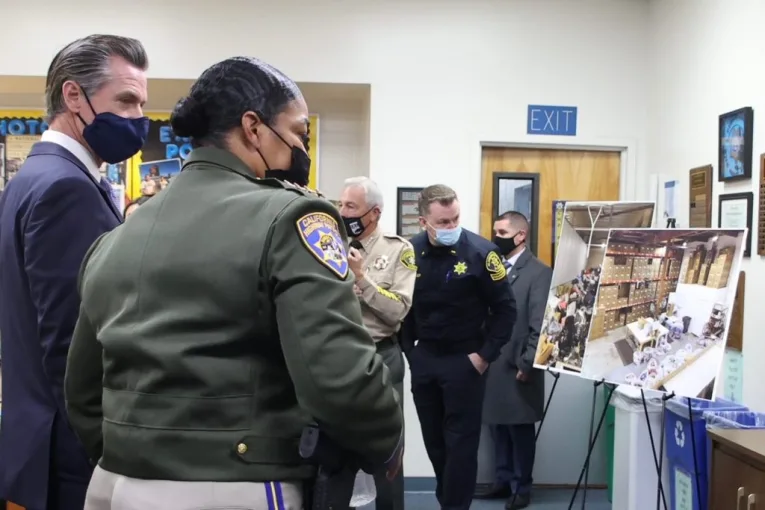
Sacramento, CA – On Thursday, Governor Newsom signed the final bill to complete California’s landmark legislative package to crack down on retail and property crime.
AB 1960, authored by Speaker Robert Rivas, is attempting to address retail theft concerns by reinstating sentencing enhancements for large-scale felony property theft crimes.
Under the new law, courts are mandated to impose an enhanced sentence when suspects take, damage, or destroy property valued at over $50,000 during the commission of any felony, including retail theft.
According to the Governor’s office, the bill targets “large-scale fencing operations” but will also apply those enhanced sentences to those who *knowingly* receive stolen property or resell such property.
“California already has some of the strictest retail and property crime laws in the nation — and we have made them even stronger with our recent legislation,” Governor Newsom said.
The Governor tried to thread the needle between tougher sentences and mass incarceration.
“We can be tough on crime while also being smart on crime — we don’t need to go back to broken policies of the last century,” the Governor said. “Mass incarceration has been proven ineffective and is not the answer — we need true accountability and strategies that enhance our nation-leading efforts to address crime. I thank Speaker Rivas for his leadership in strengthening law enforcement tools in California.”
In January, Governor Newsom called on lawmakers from both sides of the aisle to enact robust laws to better assist law enforcement and prosecutors in safeguarding communities and holding criminals accountable. Today, Governor Newsom signed the final bill in a robust and historic public safety package to strengthen California’s existing law enforcement tools and better protect Californians.
“Violent ‘sledgehammer crimes’ and flash-mob attacks by organized gangs must stop now. I authored this new law to hold appropriately responsible those who damage stores and property, because our business owners and workers should not have to live in fear that these crimes will come to their doorstep. I thank Governor Newsom for signing this bill so we can keep our communities safe,” Speaker Robert Rivas said.
“Assembly Bill 1960 serves as a deterrent against ‘smash and grabs’ and retail crime. It sends a clear message that such illicit and dangerous activities will not be tolerated, thereby helping to protect businesses, consumers, and communities from the adverse effects of criminal behavior. Those who deliberately target and destroy property in the commission of felonies will now face harsher penalties sending a clear message that this behavior will no longer be tolerated in California,” said Rachel Michelin, President and CEO of the California Retailers Association. “The California Retailers Association applauds Speaker Rivas, the bill’s author, and Governor Newsom for their ongoing leadership in addressing retail crime in California and ensuring retailers, law enforcement and district attorneys have all the tools they need to hold criminals accountable for retail theft across the state.”
“By implementing stricter sentencing enhancements for the value of stolen property, we are sending a strong message to criminals that preying on other people’s possessions will not be tolerated,” said Los Angeles County Sheriff Robert G. Luna. “This piece of legislation is vital in ensuring that those who continue to undermine our community’s well-being face appropriate consequences, ultimately creating a safer environment for all. I applaud Governor Gavin Newsom for signing AB 1960 because it represents a crucial step toward enhancing the safety and security of our communities.”
WHAT THESE NEW LAWS DO:
- CRACK DOWN ON THE THEFT AND SALE OF STOLEN ITEMS: Creates stricter penalties for individuals involved in retail and property theft, mandates sentencing enhancements for large-scale operations, and creates new crimes — imposing enhanced felony charges and extended prison sentences.
- INCREASE ENFORCEMENT AND PROSECUTIONS: Bolsters existing laws to ensure police can arrest retail theft suspects with probable cause — even if they didn’t witness a crime in progress.
- COMBINE VALUES TO MEET FELONY THRESHOLDS: Permits the aggregation of value of stolen goods, enabling prosecutors to combine the value of multiple stolen items — even across different victims and counties — to help meet the threshold for felony grand theft.
- TARGET SMASH-AND GRABS: Creates new penalties for criminals who damage businesses and property in the course of theft.
- FIGHT CAR BREAK-INS AND THEFT: Adds new and increased penalties for possession of items stolen from a vehicle with intent to resell, and allows prosecution of automotive property thefts, regardless of whether the vehicle was locked.
- ELIMINATES RETAIL THEFT SUNSET PROVISIONS: Maintains important organized retail crime statutes and task forces to protect communities. The organized retail law, which has been effectively used by CHP and others in the Organized Retail Crime Task Force, would have expired on January 1, 2026.
The Governor’s office also reminded many that California actually has a much tougher felony limit than other states.
“California law provides existing robust tools for law enforcement and prosecutors to arrest and charge suspects involved in organized retail crime — including up to three years of jail time for organized retail theft,” a release noted.
The state has the 10th toughest threshold nationally for prosecutors to charge suspects with a felony, $950. 40 other states — including Texas ($2,500), Alabama ($1,500), and Mississippi ($1,000) — require higher dollar amounts for suspects to be charged with a felony.
